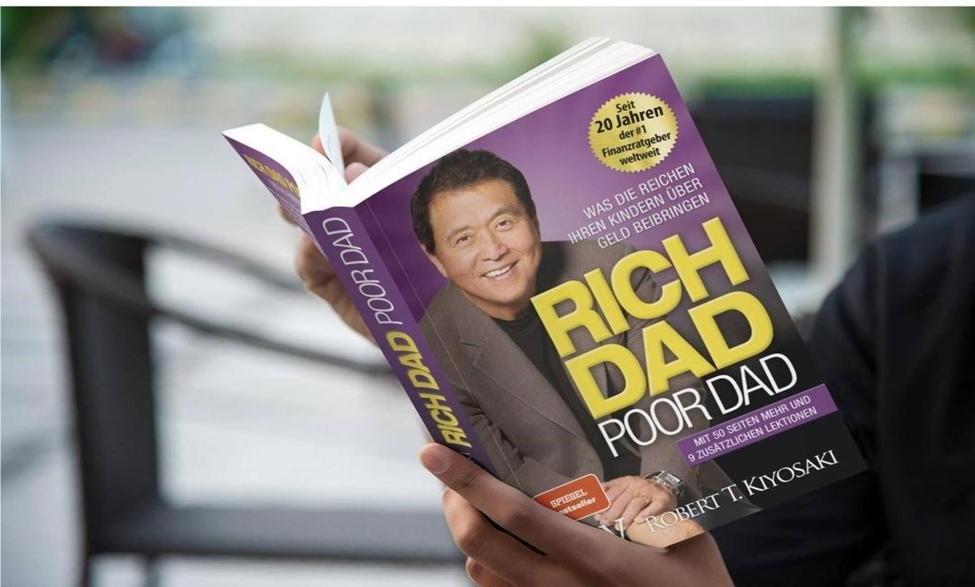Listen to this article
“Rich Dad Poor Dad” is a groundbreaking personal finance classic penned by Robert T. Kiyosaki that challenges conventional beliefs about money and wealth. With its straightforward narrative and practical insights, the book has captivated millions worldwide, making it a must-read for anyone seeking financial independence.
In this engaging memoir, Kiyosaki contrasts the financial teachings of two father figures in his life: his biological father (referred to as “Poor Dad”), who followed traditional paths of education and stable jobs, and the father of his best friend (nicknamed “Rich Dad”), a successful entrepreneur who viewed money and investing from a unique perspective.
One of the book’s central tenets is the importance of financial education, which Kiyosaki believes is inadequately taught in schools and homes. He highlights how traditional schooling often perpetuates the “get a good job, work hard, save money, and retire” mindset, which can trap individuals in the cycle of living paycheck to paycheck. In contrast, “Rich Dad” imparts valuable lessons about the significance of financial literacy, creating assets, and leveraging money to work for you.
Throughout the book, Kiyosaki shares simple yet profound principles that can lead to financial success. He emphasizes the significance of investing in oneself, acquiring assets that generate passive income, and avoiding excessive liabilities that drain one’s financial resources. These fundamental concepts, such as distinguishing between assets and liabilities, have inspired many readers to rethink their approach to money and adopt a more strategic mindset.
- Advertisement -
Furthermore, “Rich Dad Poor Dad” stresses the value of taking risks and stepping out of one’s comfort zone to seize investment opportunities. Kiyosaki’s own experiences as an entrepreneur demonstrate that calculated risks can yield substantial rewards, paving the way to financial freedom.
Critics argue that some of Kiyosaki’s advice might be oversimplified, and his examples may not apply universally. However, the book’s true strength lies in its ability to ignite curiosity and encourage readers to explore the world of finance and investing further.
Lessons Learned from “Rich Dad Poor Dad”
The Importance of Financial Education: The book emphasizes the need for a solid financial education, which extends beyond traditional schooling. Understanding money, investing, and financial principles is crucial for achieving financial independence.
Distinguishing Assets from Liabilities: “Rich Dad” teaches the importance of knowing the difference between assets and liabilities. Acquiring income-generating assets and minimizing liabilities are essential steps towards building wealth.
The Power of Passive Income: Creating streams of passive income is a key aspect of achieving financial freedom. By investing in assets that generate income without constant effort, individuals can secure their financial future.
Embrace Risk and Learn from Failure: “Rich Dad” encourages taking calculated risks and viewing failures as valuable learning experiences. Embracing risks and learning from mistakes can lead to significant opportunities and growth.
Challenge Conventional Beliefs: The book challenges traditional notions about money, work, and success. By questioning conventional wisdom and thinking outside the box, readers can discover alternative paths to financial prosperity.
Work to Learn, Not Just to Earn: Kiyosaki advocates for a mindset shift from working solely for a paycheck to using work as a means to gain valuable skills and knowledge. Continuous learning and self-improvement can lead to increased earning potential and financial success.
Avoid the Rat Race: The “Rat Race” refers to the cycle of working for money to pay expenses, leading to perpetual financial struggle. The book encourages breaking free from this cycle by focusing on building assets and passive income.
Make Money Work for You: Instead of working tirelessly for money, “Rich Dad” advises making money work for you through smart investments and passive income streams.
Seek Opportunities in Adversity: Kiyosaki shares how challenging economic times can present opportunities for those who are financially educated and prepared. Being proactive during economic downturns can lead to substantial gains.
Foster a Mindset of Abundance: “Rich Dad” emphasizes cultivating an abundance mindset rather than dwelling on scarcity. Adopting a positive outlook and believing in one’s ability to create wealth can lead to greater financial success.
Learn to Manage Taxes: Understanding and managing taxes effectively can significantly impact one’s financial well-being. “Rich Dad” highlights the importance of tax education and legal strategies to minimize tax burdens.
Focus on Long-Term Goals: Building wealth is a gradual process that requires discipline and long-term thinking. “Rich Dad” advises setting clear financial goals and consistently working towards them over time.
In conclusion, “Rich Dad Poor Dad” is a compelling book that encourages readers to reevaluate their attitudes towards money and presents alternative ways of thinking about wealth and financial independence. While some aspects might be subject to individual interpretation, the book’s core message about financial education, smart investing, and embracing opportunities is undeniably valuable. For those seeking to improve their financial well-being and break free from conventional money paradigms, this book serves as a thought-provoking and inspiring guide.








